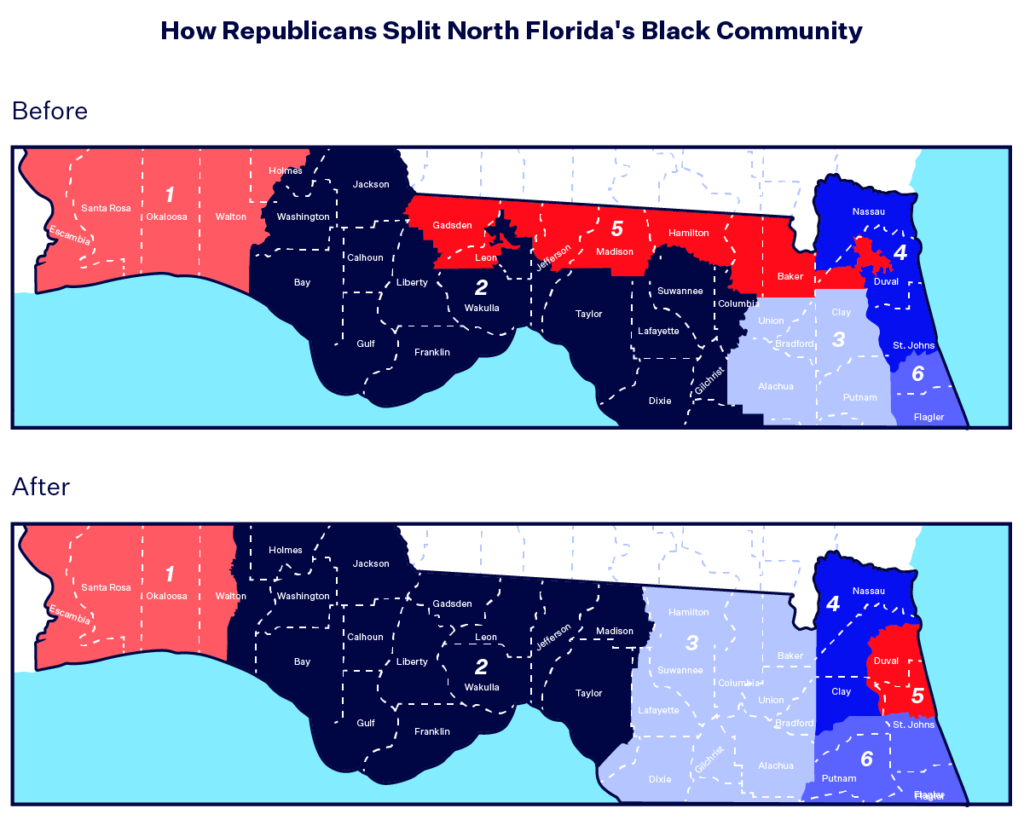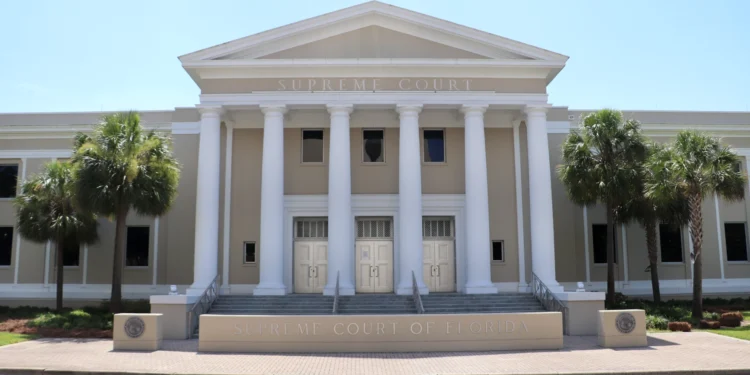July 18, 2025 Story by: Publisher
Florida’s Supreme Court on Thursday upheld the state’s current congressional redistricting map, rejecting a challenge over the elimination of a majority-Black district in north Florida.The court rejected a challenge to the state’s congressional map, a decision that weakens the influence of Black voters in the state and could make it easier to draw gerrymandered maps in the future.
The court ruled that restoration of the district that previously united Black communities from Jacksonville to west of Tallahassee, or across 200 miles (322 kilometers), would amount to impermissible racial gerrymandering. That, the majority ruled, violates the Constitution’s equal protection guarantees.
The court’s conservative majority ruled 6-1 to reject a legal challenge to the map, which dismantled Florida’s 5th Congressional District — a district that once stretched from Jacksonville to Tallahassee and had historically enabled Black voters to elect a candidate of their choice. The district had been represented by Democrat Al Lawson until the new map was enacted for the 2022 midterms.

Photo courtesy of: Democracy Docket
A majority of Justices ultimately said the Black Voters Matter Capacity Building Institute and other plaintiffs failed to prove racial discrimination or a need to preserve a North Florida district previously represented by a Black Democrat.
Earlier redistricting efforts by the state Legislature included versions of the north Florida district that preserved Black voting power. But after a veto by DeSantis, the governor pushed through the current map that eliminated it.
In its ruling, the Supreme Court said one problem for the plaintiffs was they did not propose a viable alternative map but only pointed out potential problems with the current one.
Chief Justice Carlos Muñiz Majority Opinion
A majority opinion written by Chief Justice Carlos Muñiz accepted DeSantis’ past arguments that the Equal Protection Clause in the U.S. Constitution overrides a demand in Florida’s Fair Districts language that the power of minority voters cannot be diminished in the redistricting process.
“The Legislature’s obligation to comply with the Equal Protection Clause is superior to its obligation to comply with the Non-Diminishment Clause as interpreted by our Court,” he wrote. “The plaintiffs did not prove the possibility of complying with both the Non-Diminishment Clause and the Equal Protection Clause in North Florida. Therefore, they did not meet their burden to prove the invalidity of the Enacted Plan.”
Chief justice Muñiz, a DeSantis appointee, wrote the majority opinion and agreed that the old district was one in which Black voters could elect their preferred candidate and that the new map diminished their ability to do so. But, he added, the relevant question was whether it was possible to draw districts that complied with the non-diminishment requirement without allowing race to predominate. The plaintiffs, he said, had not proven that was possible.
“The record leaves no doubt that such a district would be race-predominant. The record also gives us no reasonable basis to think that further litigation would uncover a potentially viable remedy,” he wrote. “It is likely impossible to draw a non-diminishing district … in North Florida without subordinating the FDA’s mandatory race-neutral districting standards.”
A Major Shift for North Florida
The decision means Florida’s current congressional districts that give Republicans a 20-8 advantage over Democrats will remain in place for the 2026 midterm elections and beyond. The former north Florida district was most recently represented by a Black Democrat, former Rep. Al Lawson. The new districts divide that area among three Republicans.
Byrd v. Black Voters Matter
Byrd v. Black Voters Matter Capacity Building Institute, Inc. is a case concerning Florida’s 2022 congressional redistricting plan and whether it violated the state constitution by diminishing Black voters’ ability to elect candidates of their choice.
Specifically, the lawsuit challenged the dismantling of Florida’s former Congressional District 5 (CD-5), a North Florida district that had historically allowed Black voters to elect their preferred candidate.
- The lawsuit was filed under Florida’s Fair Districts Amendment, a constitutional provision that prohibits redistricting plans from diminishing minority voting strength.
- Plaintiffs (including Black Voters Matter Capacity Building Institute) argued that the elimination of CD-5 violated this non-diminishment clause by cracking a Black voting population across several districts.
Source: PBS / The Guardian

















